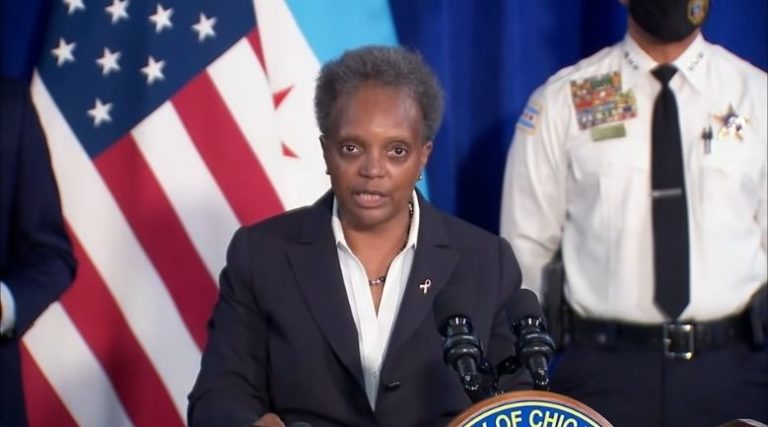“I think mayors across the country, particularly in this time, we have a moment where we can really change for the good, the narrative around accountability and legitimacy and policing. And we’ve got to seize this moment and move forward aggressively and not be timid. We’ve got to be bold.”
That’s what Mayor Lori Lightfoot of Chicago had to say in June of 2020 as the U.S. Conference of Mayors launched a working group on Police Reform & “Racial Justice” following the killing of George Floyd in Minneapolis.
She would subsequently go on to slash the Chicago PD’s budget by roughly $80 million for the 2021 budget.
While Lightfoot likely scored political brownie points with her Progressive allies, what she accomplished by simply defunding her own city’s police department was neither effective reform, nor racial justice.
According to reporting done by conservative outlet, The Blaze, as of September 1st Chicago “has recorded 524 homicides and 2,344 shootings — up 3% and 9%, respectively, over the same time period last year.”
As of October 18, 2021, a homicide tracker compiled by The Chicago Sun Times reports that 784 victims have been killed in Chicago over the last 12 months…628 were African Americans.

Not only have Lightfoot’s policies and defunding of her city’s police department not created any meaningful reform, but they have also exacerbated the rampant victimization of the very group she pretends to be advocating for.
Ultimately, Mayor Lori Lightfoot cannot escape the ramifications of her decisions. She is reminded of them each weekend when dozens are shot in her city.
But at least her failure is forcing her to backtrack.
When announcing her city’s $16 billion budget for fiscal year 2022, a welcomed surprise was part of her spending package.
Police 1 reported in September that in addition to a host of increased spending towards the city’s social programs:
“Lightfoot’s 2022 budget also boosts police spending to $1.9 billion, up from $1.7 billion in 2021, a move that will likely be criticized by some as elected officials debate the best way to address the city’s violence, which has remained elevated after surging in 2020 to some of the highest levels in decades.”
It is unclear how the city’s police department will use the additional funding provided by Lightfoot’s new budget but working backwards from what was cut from the budget last year may provide some clues. Of the $80 million cut last year, $34 million was cut from funding already vacant positions.
While Chicago has been notoriously dangerous for years, what has unfolded since 2020 was completely avoidable. Increased bloodshed is directly linked to failed “defund” policies, and while more money cannot bring back the lives lost, Chicago’s latest budget proposal provides hope that the city’s officials will finally do the right thing by its overwhelmed police force, and most importantly, its citizens.
Image Credit: Screenshot from ABC 7 Chicago Youtube channel
Across the country, calls to “defund the police” have emerged from protesters following the deaths of George Floyd and others. While these calls are easy to share on social media and yell in the street, actually implementing them is much more difficult — and dangerous — for our communities.








